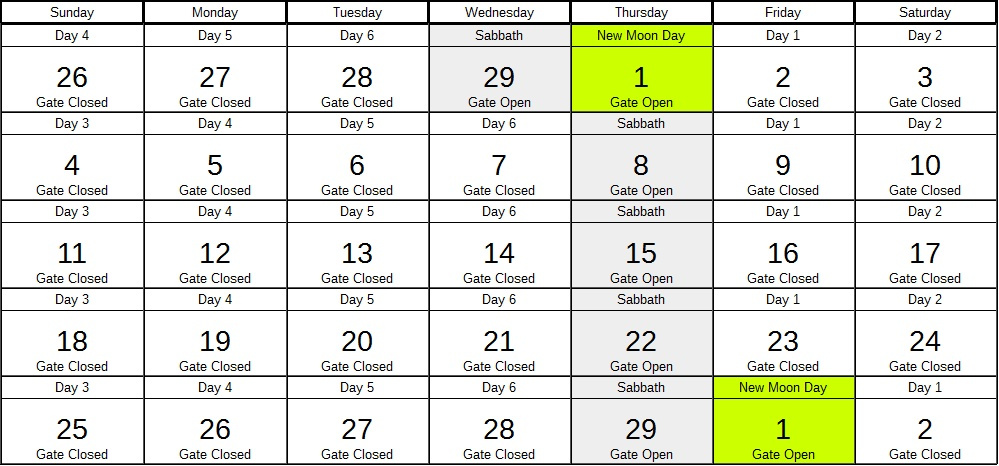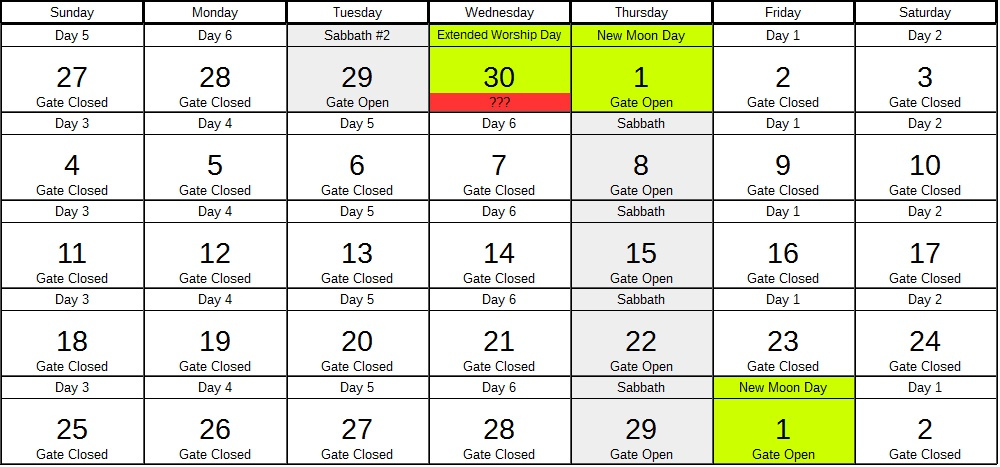Ezekiel 46:1: Difference between revisions
No edit summary |
No edit summary |
||
| Line 3: | Line 3: | ||
|titlemode=replace | |titlemode=replace | ||
|keywords=Lunar Sabbath, Extended Worship Day, New Moon Day, Luni-Solar Calendar, East Gate | |keywords=Lunar Sabbath, Extended Worship Day, New Moon Day, Luni-Solar Calendar, East Gate | ||
|description=Ezekiel 46:1 is often cited to explain why the New Moon Day is not considered one of the six working days of the week on the Lunar Sabbath Calendar | |description=Ezekiel 46:1 is often cited to explain why the New Moon Day is not considered one of the six working days of the week on the Lunar Sabbath Calendar. | ||
}} | }} | ||
'''Ezekiel 46:1''' is often cited to explain why the New Moon Day is not considered one of the six working days of the week on the [[Lunar Sabbath Calendar]]. | '''Ezekiel 46:1''' is often cited to explain why the New Moon Day is not considered one of the six working days of the week on the [[Lunar Sabbath Calendar]]. | ||
Revision as of 16:42, 19 November 2022
Ezekiel 46:1 is often cited to explain why the New Moon Day is not considered one of the six working days of the week on the Lunar Sabbath Calendar.
This page presents the rationale for why it should be considered a separate day, and discusses several objections.
Rationale
According to the Lunar Sabbath Calendar, the New Moon Day is a worship day that is not one of the six working days of the week. This is proven using the beginning of Ezekiel 46:
Thus saith YHVH; The gate of the inner court that looketh toward the east shall be shut the six working days; but on the sabbath it shall be opened, and in the day of the new moon it shall be opened. And the prince shall enter by the way of the porch of that gate without, and shall stand by the post of the gate, and the priests shall prepare his burnt offering and his peace offerings, and he shall worship at the threshold of the gate: then he shall go forth; but the gate shall not be shut until the evening. Likewise the people of the land shall worship at the door of this gate before YHVH in the sabbaths and in the new moons. (Eze 46:1-3)
The East Gate is closed during the six working days of the week, but it is open on the seventh day (the Sabbath) and it is open on the New Moon Day (the first day of the month). It's not possible that the New Moon day is one of the six working days, because this scripture clearly requires that the East Gate be shut during those six days. This can be illustrated in the calendar shown below:
This calendar clearly shows how the requirements of Ezekiel 46:1 can only be met when the New Moon Day is not considered one of the six working days of the week. The New Moon Day is the first day of the month, but it is not considered a day of the work week.
Objections
Denying the Antecedent
The assertion presented above is based on a type of Formal Fallacy referred to as Denying the Antecedent. This is an invalid argument that infers the inverse of the original statement.
For example, consider this true statement:
- If it's raining, then the grass will be wet.
The inverse of this statement would then be:
- If it's not raining, the grass will be dry.
The second statement is not necessarily true, because there are other reasons why the grass could be wet. For example, if the lawn sprinklers are running, the grass will be wet even when it's not raining. Therefore the second statement is not a valid argument even though the first statement is true. However, we could clarify the second statement in order for both statements to be true:
- If it's not raining, the grass will be dry.
- But when it is raining the grass will be wet, and when the sprinklers are running the grass will be wet.
In this example the first line is not an absolute truth but a "rule of thumb". The exception to the rule is when the sprinklers are running.
If the first statement was an absolute truth, it could be argued that the sprinklers only run when it is raining. That's obviously a ridiculous conclusion to make, but if it has to be true that the grass is only wet when it rains, and the sprinklers cause the grass to be wet, then the sprinklers must only run when it's raining or they violate that "absolute truth".
Ezekiel 46:1 uses the same format as the above example to describe the days on which the East Gate will be open or closed:
- The gate of the inner court that looketh toward the east shall be shut the six working days
- but on the sabbath it shall be opened, and in the day of the new moon it shall be opened.
In this case, the "rule of thumb" is that the East Gate is normally closed on workdays, but it will be open on New Moon Days. This statement does not prove that the New Moon Day is a non-working day any more than the example statement proves that the sprinklers only run when it is raining. This is because the first statement is a "rule of thumb", with an exception to that rule (the new moon) specifically cited.
The Voluntary Offering
It cannot be true that the first part of Ezekiel 46:1 (i.e. the East Gate will always be closed during the six working days) is an "absolute truth", because that assertion is contradicted by Ezekiel 46:12 :
Now when the prince shall prepare a voluntary burnt offering or peace offerings voluntarily unto YHVH, one shall then open him the gate that looketh toward the east, and he shall prepare his burnt offering and his peace offerings, as he did on the sabbath day: then he shall go forth; and after his going forth one shall shut the gate. (Eze 46:12)
This passage describes the same Prince of verse 1 coming to the temple with a voluntary offering. When he arrives, the East Gate will be opened, and when he leaves the gate will be closed. This does not happen on a Sabbath or New Moon because the gate is not already open when he arrives. Clearly then, this is another exception to the rule in v1 that the gate will be closed during the six working days. If we add this exception in verse twelve to the details in verse one, we obtain the following statement:
- The gate of the inner court that looketh toward the east shall be shut the six working days
- but on the sabbath it shall be opened, and in the day of the new moon it shall be opened, and when the Prince offers a voluntary burnt offering or peace offering it shall be opened.
By considering both verse one and verse twelve, it should be clear that the first part of verse one is a "rule of thumb", and not an absolute truth. Therefore it cannot be proven that the New Moon Day is a separate day from the "working days" in verse one.
Extended Worship Days
A major problem with applying Ezekiel 46:1 to the Lunar Sabbath Calendar is that there is no provision for Extended Worship Days. Since the Lunar Month is approximately 29.5 days long, every second month will have thirty days instead of twenty-nine. The thirtieth day of the month is an Extended Worship Day, which cannot be considered one of the six working days, or a Sabbath, or the New Moon day. Unfortunately, Ezekiel 46 does not mention Extended Worship Days at all. It does not define whether the East Gate should be open or closed during that day. This is a major problem if Ezekiel 46:1 is to be considered an "Absolute Truth". See the example calendar shown below:

